IN MEMORIAM
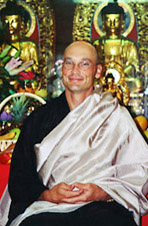 Shi Yin Zhao, O.H.Y.
Shi Yin Zhao, O.H.Y.1957 - 2008
Michael J. Kistler's obituary at Miller Funeral Home
On August 9th, our brother in the Dharma, Da Shi Yin Zhao, - to us just simply Mike - died while doing something he loved to do. He was running and likely had a heart attack. He ran at least five miles every day and he ran those miles in a place no power on earth could get him to leave: South Dakota. At any time of year he loved to be outdoors, "checking out nature," as he put it. We used to kid him about the weather, asking how many pair of snowshoes he went through in a season. He never would tell us. But he would inform us of his unavailability during vacation season: "We get 8 hours of summer every year." he'd say, "and I'll be playing golf for all of them."
Sometimes we're asked to name the facets of a person's character that reflect the most light. In Mike's character those would be humility and fidelity to commitment. When he first received instructions in the proper way to meditate, he followed the instructions exactly and achieved amazing success. He quickly passed through ordinary forms of meditation - the egoless peace; the suspension of sensory input, the visionary apprehension of the Platonic Ideal Forms, and so on. And then he experienced the higher states of Divine Union. With an eloquence few who knew him would recognize, he described the glorious perfection of God and the exquisite love and security of the divine embrace. The earth, he rhapsodized, had suddenly taken on a new beauty and he considered himself unworthy to have been so blessed to see it. I printed out those emails. They are the priceless artifacts of my thirty years in the Dharma. He continued his spiritual ascent, but these events we talked about in person or on the phone.
Michael was retired Air Force, a twenty year enlisted-man. He loved his country, probably because South Dakota was in it. His political views were conservative as we would expect; but he was not a man to talk casually about politics or even religion. He could answer a two page email with a single sentence or even a single word. Often he did not answer at all. He had ascended to extraordinary mystical heights and attempts were made to spy on his electronic correspondence. He would change his email address or disconnect his service; and then he'd let his kids use his computer for their school work. The nature of advanced spiritual states and techniques is such that first he necessarily deleted his personal files.
Although he was not electronically communicative, mail that came to him via the postal service was another story. Mike lived among Christians and had a long standing respect for the Bible. He was fond of quoting lines from Christ's Sermon on the Mount. "I was hungry and you fed me. I was thirsty and you gave me drink. I was in prison and you visited me." When he learned that many of the men in my prison ministry wanted to talk privately with a male priest, he told me to give them his address. I recall being surprised when the first man he corresponded with came to services with a three page hand-written letter from Mike. He unfailingly wrote to the men and even gave some of them Buddhist Precepts. In a very real sense, my prison ministry was his, too.
He never felt the need to compromise. His desires were simple and attainable. Providing for his children and the wife he loved was his first priority; performing a two hour meditation program every day was his second; maintaining his physical health was his third. When he retired from military service, he enrolled in college; and when he got his degree he accepted a position in the banking industry. His work hours allowed him to spend mornings at home when he could complete his meditation and running programs. He rose quickly to positions of responsibility and at one point, to his delight, his company sent him to supervise the opening of a branch office in the beautiful Black Hills of western South Dakota. Mike was a trout fisherman and being sent to the Black Hills was like being sent to Heaven. After a year or so, when that assignment was completed, he bought a home back in the eastern part of South Dakota in the suburbs of Sioux Falls where his family could have access to social amenities. He needed nothing more than to get back and forth to his job. Access to a golf course was a bonus.

He spoke very little about his home life; but every now and then he confided something that gave a glimpse of life in his house. Michael attained heights of meditation that masters of every religion would envy. He could stay in the ecstasy of Divine Union for hours; but sometimes he would use different techniques and generate so much Qi power that an electric jolt would traverse his spine and he would be hurled backwards. It wasn't this he was talking about. The point of his remarks was an old worn Victorian settee that his wife wanted to get rid of - but that he insisted on keeping because its upholstered cushion was the precise height to catch his back at shoulder level. "Ugly or not," he said, "I need to have that couch directly behind me when I'm 'on the pillow.'" He meditated in the den of his home and I used to laugh thinking about his wife having to suffer the sight of an ugly Victorian settee in her newly decorated den.
Michael was the first person to whom I gave Buddhist Precepts. This was long before there was a Zen Buddhist Order of Hsu Yun. In the 1980s we were the Nan Hua Zen Buddhist Society, which is still a functioning group; and in that sangha I gave him the name Fa Hui. He received the name Yin Zhao from his master who, coincidentally, was Fa Hui, the Abbot of Hsu Yun Temple in Honolulu.
If Michael owed his spiritual attainments to anything it was his egoless, unselfconscious disposition that gave him the ability to focus his attention inwards. Few things in his life had the power to distract him. He did not, as we say, "sweat the small stuff." If Madison Avenue's advertising agencies had a doomsday scenario, it would be that the world was suddenly populated by people like Mike who did not care about fashion, or an Ivy League degree, or an impressive job title, or driving a high-end car, or living in an upscale neighborhood, or belonging to a country club. Society, to him, was solitude.
His three favorite books were Ernest Wood's Yoga; Mircea Eliade's Yoga: Immortality and Freedom; and Elemire Zolla's The Androgyne. He also liked to read Krishnamurti, Irwin Rousselle, Carl Jung, D.T. Suzuki, and Julius Evola. He was captivated by Japanese Haiku, particularly Issa's poems. He enjoyed Rumi's poetry and the works of Hsu Yun.
He liked sports, baseball in particular. As a kid I liked baseball too, and we would often talk about the way Joe Dimaggio, the Yankee Clipper, would skim the surface of the outfield and make an impossible catch look easy. We marveled at the ballet of a perfectly executed double play. Balanchine, he thought, couldn't have choreographed it better. He regarded Yogi Berra as the Jonathan Swift of the dugout and often quoted his strange but meaningful maxims. He liked Pink Floyd, Devo, and R.E.O. Speedwagon among many others. He meditated to their music and lyrics which carried him into an exalted realm. Jessye Norman singing the Liebestod could take him into more exotic realms. The last meditation techniques he was experimenting with were the koan and a new way to meditate on Haiku.
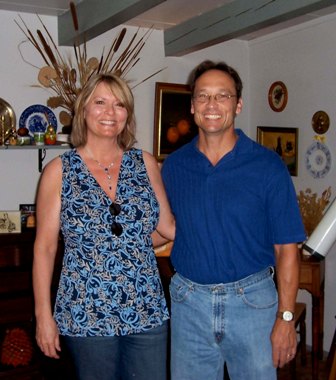
He knew how dear he was to me and how integral he always was to my ministry. He would call me on every birthday and even come to visit me every few years. We'd have lunch in Death Valley or at Lake Mead Marina or in Red Rock Canyon. And we'd always have photos taken.
When I was 71 he visited, and after lunch we saw the film Ong Bak. This photo of us together was taken then.
Last year, when I was 73 he came with his wife. I remembered Debbie when she was a beaming, pretty young mother. Here, twenty years later, she's a radiant grandmother, and even without makeup she's still pretty.
I looked for a suitable verse to end this remembrance of him. Though Mike was a man of disparate tastes, he always preferred plain to fancy, and would have continued this preference even in eulogies. I had to choose carefully. He might be watching, and an enlightened man sees beyond the beauty of words.
Shakespeare gave us the most beautiful words ever written. Juliet, in soulful purity, speaking of one she truly loves, says:
When he shall die,
Take him, and cut him out in little stars,
And he will make the face of heaven so fine
That all the world will be in love with night.
Michael, I think, would have preferred me just to let him speak through Issa in his "Last Will" hhaiku:
I hereby assign
In perpetuity, to wit:
To this bird, this fence.
- Ming Zhen Shakya, O.H.Y. (Nevada)
From Abbot John
When the Buddha died one of his disciples was asked, "What did you really get from the Buddha?"
He replied, "He showed me the brightness of the world."
Michael did that for me as well and it's all I have to say.
- Abbot John (New Jersey)
A Remembrance from Fa Jun Shakya
In these moments it's so hard to find the right words to express the sadness inside me. Words just seem superfluous.
I was lucky enough to have had the honour to meet Mike in a very needful moment of my life. Sometimes God sends very special people to help others. Michael must have been one of them. He was there not only to listen but to help me find solutions. He knew how to give a person exact directions with very few sentences. I think this was due to his high level of insight.
Whenever I needed his help he was always there.
His deep knowledge of meditation is rarely possessed by any teacher. I will give all of my efforts to perfecting what he taught me. Dedicating my efforts to him is the least I can do to honour his name.
I also had the good fortune to collaborate with him in the writing of Assault On The Summit; and I was so proud when he saw a photo of a ladybug walking up my arm towards my mala and immediately decided that we should use the photo on our book's cover.
Mike, you will never be forgotten. Rest in peace, Sifu.
Sarai sempre nel nostro cuore.
- Fa Jun Shakya, O.H.Y (Italy)
The Way of Life
Versicle Nš 50
Translated by Witter Bynner
Death might appear to be the issue of life,
Since for every three out of ten being born
Three out of ten are dying.
Then why
Should another three out of ten continue breeding death?
By use of sheer madness to multiply.
But there is one out of ten, they say, so sure of life
That tiger and wild bull keep clear of his inland path.
Weapons turn from him on the battle-field,
No bull-horn could tell where to gore him,
No tiger-claw where to tear him,
No weapon where to enter him.
And why?
Because he has no death to die.
- Contributed by Yao Sheng Shakya (Argentina)
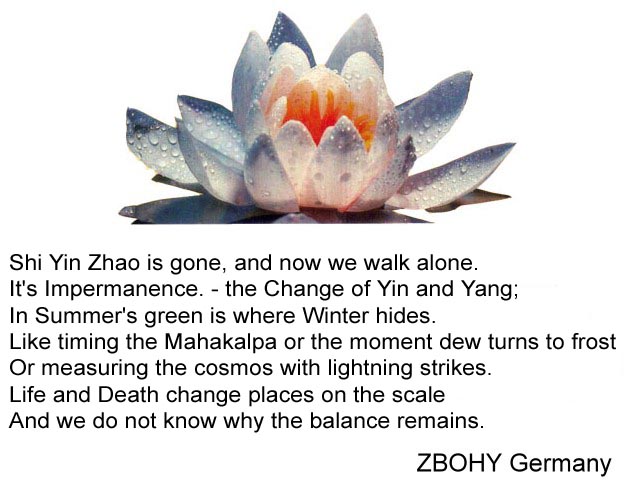
May I express my condolences at the passing of Shi Yin Zhao. Music offers some comfort.
Yao Xiang Shakya (Alaska)
This is the hour of lead
After great pain, a formal feeling comes -
The Nerves sit ceremonious, like Tombs -
The stiff Heart questions was it He, that bore,
And Yesterday, or Centuries before?
The Feet, mechanical, go round -
Of Ground, or Air, or Ought -
A Wooden way
Regardless grown,
A Quartz contentment, like a stone -
This is the Hour of Lead -
Remembered, if outlived,
As Freezing persons, recollect the Snow -
First--Chill--then Stupor--then the letting go -
Prayers for your well-being rise with the smoke from the incense.
Perhaps the deepest reason why we are afraid of death is because we do not know who we are. We believe in a personal, unique, and separate identity--but if we dare to examine it, we find that this identity depends entirely on an endless collection of things to prop it up: our name, our "biography," our partners, family, home, job, friends, credit cards. . . It is on their fragile and transient support that we rely for our security. So when they are all taken away, will we have any idea of who we really are?
Without our familiar props, we are faced with just ourselves, a person we do not know, an unnerving stranger with whom we have been living all the time but we never really wanted to meet. Isn't that why we have tried to fill every moment of time with noise and activity, however boring or trivial, to ensure that we are never left in silence with this stranger on our own? (From "The Tibetan Book of Living and Dying" by Sogyal Rinpoche,)
Contributed by Yao Xiang (Indiana)
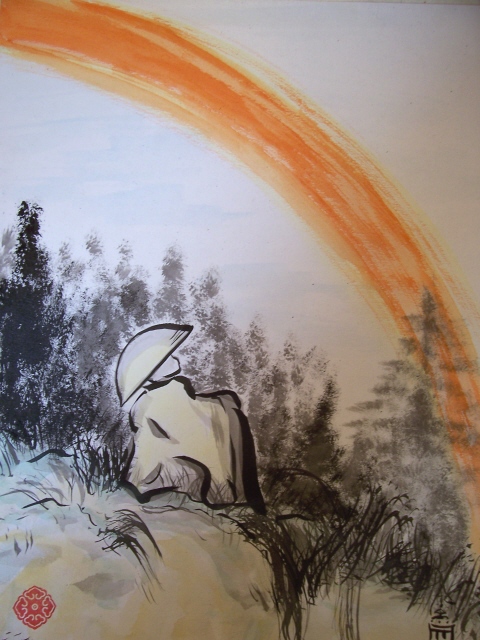 Yao Feng Shakya
Yao Feng Shakya
Master Yin is gone.
Or is he?
I felt him leave.
Without saying hello.
I said goodbye.
As tears stream
down my eyes.
My brother
who gave his life
to serve others.
He is my hero.
Now in Buddhas loving arms.
He is reborn in the land
of love n light.
Tonight.
Falling stars fall from the sky.
I see his smile.
He is still with us.
In the heart.
- Yao Feng Shakya (Oregon)
I'm truly very sorrowful by the death of Master Shi Yin Zhao. I will pray for him and, please, kindly convey my condolences to his family and to the whole Sangha. I've never met him but I think he was a wonderful man.
Yours in the Dharma and in gassho
Yin Shan Shakya (Italy)
Dear Sensei,
Unfortunately we never meet in this life. I have only your picture and your teachings on our wonderful website, but I'm sure that your smile, your heart, and your faith will continue to guide our Sangha. We are a small group: Yin Shan, Yin Fu, my wife Laura Myoshin, and some friends, but I want to tell you THANKS for the Big work you had made for us.
You, Ven. Ming Zhen, and other Masters, have created a Precious Center of Buddhism. Your Faith and your Love made possible for us to follow Hsu Yun Master's Teachings and to be happy.
I'm sure Shakyamuni Buddha is near to you and smiling.
CIAO MAESTRO!
Gassho
Fa Geng Shakya and SANGHA DEL LOTO MERAVIGLIOSO Roma-Piacenza (ITALIA)
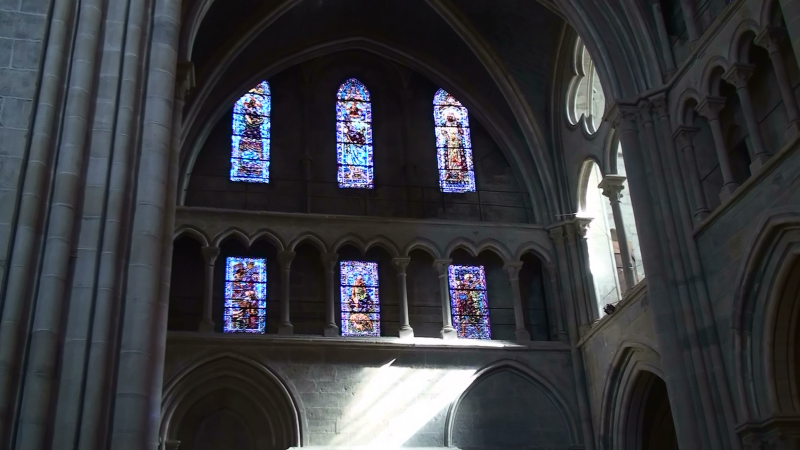 Chuan Ming Shakya
Chuan Ming Shakya
In deepest sympathy,
Chuan Ming Shakya (Spain)
